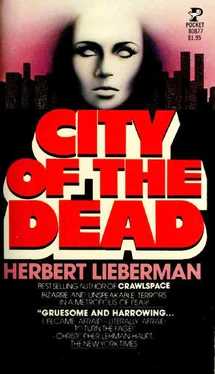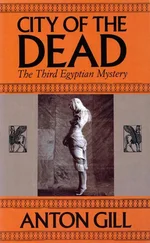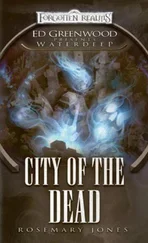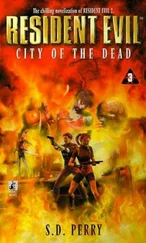In the corner near the bed is Mary Haggard’s wheelchair. The victim of a slowly worsening neuromuscular disease, she has used that chair for nearly the full twenty years of her marriage.
Displacing the books from their spot on the table, Haggard carefully sets the tray down beside the large double bed. Next he spreads a napkin across his wife’s lap, then pours her tea.
“Isn’t it beautiful, Frank?” she says, taking the tea from him, her eyes still focused on the TV. There on the large color screen is a spectacular view of the Grand Tetons.
“Wyoming?” he asks.
“Yes. It’s a travelogue. Sit down and watch a while.”
She makes room for him beside her on the bed, but he will not discomfort her. “I’ll stand. I’ve been sitting all day.”
And so, arms folded, leaning against the wall in his apron, the detective hovers above his wife, watching the screen and still thinking about Boston. Gone is the surly, growling manner he reserves for the office and the precinct houses. With Mary Haggard he becomes uxorious, attentive, almost courtly.
“Can’t get over how lovely it is,” she says. On the screen a great six-point stag saunters majestically down to the shore of one of those tiny gemlike lakes sequestered, still and timeless, high in the mountain forests of the Yellowstone. Suddenly she looks up at him, smiling. “Wish we could go.”
“Someday, maybe.” He smiles quietly down at her, knowing she would never be able to make the trip.
Suddenly the phone rings out in the kitchen. Haggard’s legs are moving instantly. “I’ll be right back.”
“Who?”
A hoarse, gruff voice, thick with sibilants and a heavy accent, jabbers frantically at him.
“Who?”
“Guzman—Guzman. Antonio Guzman.”
“Oh, yes—Mr. Guzman.”
“Das right. You remember? Da superintendent. You come up here. We spoke a couple days ago.”
“That’s right. I remember.”
Mr. Guzman proceeds to jabber more frantically. He speaks in a whisper, as if he feared being overheard. His sibilants crackle and hiss so sharply through the phone that Haggard has to hold the receiver away from his ear. Intelligible words come to him only in snatches. “Dem guys—”
“Who?”
“Dem guys. Dem guys. Wit’ the bombs—”
“They’re there?”
“Yeah—das what I’m say in’. They come back again. Just like you say. They here now.” His voice cracks and he coughs violently into the phone. “Movin’ out stuff. Loadin’ up a car. You told me to call, remember?”
“I remember,” Haggard nearly shouts, tearing off his apron. “Can you stall them there awhile?”
“No, man. I ain’t gonna mess wit’ dem. No way. Dey’re bad. Bad.”
“How many?”
“Four. You betta hurry. They ain’t gonna stay aroun’ all night.”
“All right. I’m coming right over.”
Haggard flings the phone back into the cradle, starts out, comes back, makes two fast phone calls. Then he strides back to the bedroom, composing himself so as not to alarm his wife.
“Gotta go out,” he says, rolling down his sleeves. Mary Haggard watches him strap on his shoulder holster.
“Trouble?” she asks, unruffled by the haste in which he must leave. She has lived with Frank Haggard long enough to understand and accept the irregular pattern and rhythm of his life.
He shrugs. “Maybe. Anyway, I called Mrs. Grogin. She’s coming right over to sit with you. Don’t touch that chess game. Figure I got you checkmated the next three moves.” He slips into his jacket, then, holding her chin in his great raw, red paddle of a hand, he stoops to kiss her.
“Be careful, dear.”
“No sweat,” he growls happily. “Don’t wait up. Dream of the Tetons. I got a couple of weeks coming to me. Who knows? Maybe we’ll go this spring.”
It’s no distance from Parkchester in the east Bronx to Fox Street in the south Bronx. In fifteen minutes’ time Haggard has pulled his Pontiac Le Mans convertible out of the garage, pointed it west on Tremont Avenue, blazing through West Farms to Southern Boulevard, then south on into the no man’s land the police call Fort Apache. It is a grim landscape strewn with sprawling tenements and abandoned buildings crawling with rats and junkies. There is the look of a bombed-out city about it, a place of undeclared war where the grim battle of survival, even at the basest level, is perpetually waged. Finally Haggard turns west, into Fox Street.
Full darkness has descended over the scene and only the dim orange glow of a solitary street lamp, the rest having been stoned out by marauding gangs of teenagers, illuminates the night.
Fox Street is narrow. The crowded tenement buildings huddling there appear to arch inward above the street, blacking out any view of the sky. Cars are parked on either side of the street, but there are no people in the street People don’t walk on Fox Street after dark.
The moment Haggard turns the corner into Fox Street he sees what he’s looking for. There, double-parked in the street up ahead, beneath the single street lamp, is a black late-model station wagon. Its doors are open, its tailgate down. Several people are scurrying around it in the dim light.
The detective cruises slowly to within twenty feet of it and watches for a while unnoticed. Finally he withdraws the .38-caliber police special from its holster and steps out into the night. Crossing casually to the station wagon he is aware of his own accelerated heartbeat and the sound of his footsteps ringing on the empty pavements.
He reaches the station wagon just as a burly, panting figure lumbers from the building, hauling a large table-model TV to the car. There’s a great deal of noise and activity from within the station wagon, where several people, unaware of the detective standing there, are busy packing clothing, luggage, odds and ends of furniture. Just as the burly figure, grunting with his burden, is about to shove the TV in over the tailgate, he glances up and notices the tall, white-haired figure waiting patiently there beside the car.
Haggard stands silently peering into the startled face. It’s a face the detective knows well, having seen it dozens of times in the last few days on mug shots, wanted posters, police files, FBI dossiers. In the hazy glow of the street lamp, the big, thick acromegalic features, the abnormally large head, are even more apelike, more grotesque than in the photographs.
Still holding the TV, Janos Klejewski stares blankly at the tall man with the white fleecy hair, then down at the .38-caliber police special pointed squarely at his belly. In the next moment his head snaps sharply, first right, then left, his eyes sweeping the street just in time to see the two 16th Precinct patrol cars Haggard had called for from home turn the corners and wheel slowly toward them from each end of the street.
“Hello, Kunj.” The detective smiles warmly and points to the TV. “Can I give you a hand with that?”
Sunday, April 21. 2:55 a.m. Canal Street.
Paul Konig sits alone in his car on the edge of Chinatown. He is parked on the south side of Canal Street close to its extreme east end. The nose of the car is facing the huge illuminated towers of the Brooklyn Bridge. On the seat beside him is the Gladstone bag.
He has been sitting there now for well over a half-hour, having set out at approximately 1:30 from Riverdale. It is drizzly outside after a heavy April drenching and from time to time Konig wipes his windshield with a wad of Kleenex to keep it clear. The wide-arc street lamps poised like rows of sentinels along the street are all circled with white gauzy halations.
Once again Konig checks his wristwatch, following closely the progress of the minute hand creeping across the face of the dial.
Читать дальше












